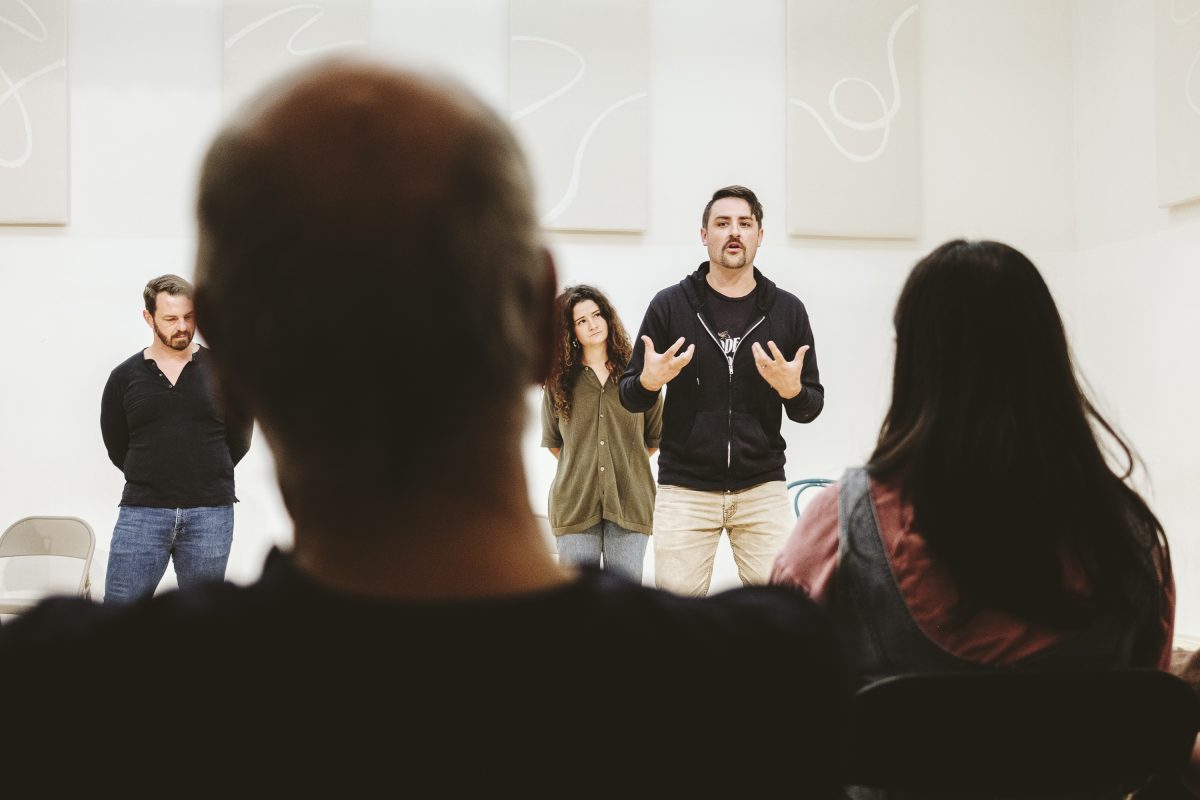One of my favorite things to do is laugh. A hearty laugh makes a bad day a little less bleak and a good one golden. Live comedy has always been something I enjoy and have often fantasized about trying.
As a small child, I enjoyed performing—ballet, school plays, living room magic shows. Then adolescence crash-landed and middle school happened to me (as it does to us all). Self-consciousness rooted and ran wild like the destructive weed it is. I forced myself to overcome stage fright in high school, but it’s a battle I still fight every time I need to appear in front of a group. Though I was a certified “Whose Line Is It Anyway?” addict back in the day, I thought I’d shelved my comedy dreams for good.
Then I entered middle age, and, along with all the less-fun parts like plantar fasciitis and hot flashes, I unlocked that adulting achievement of having far fewer fudges to give about getting embarrassed. And that’s how I ended up enrolled in a Big Blue Door improv class.
What
Taking a Big Blue Door improv class.
Why
To challenge myself to get outside my comfort zone (and hopefully laugh a lot doing it).
How It Went
I’m still laughing.
At the first class, anxiety and excitement duked it out in my guts—very first-day-of-school vibes. The group members quickly realized we’d have little time to sit and think about our nerves though. Our intrepid instructor told us to “circle up,” and before we knew it, we stood playing a game to learn names and one true thing about each other. I didn’t realize how vulnerable and, to quote the introverted goddess Emily Dickinson, “public like a frog” the entire experience was going to be. But, golly, improv sure feels like the right kind of hard, the kind that comes from growth.
Class continued through a series of group and partner activities. Trust grows quickly with classmates from absolute necessity. In my limited experience, improv demands that we’re 100 percent present in the moment—and 100 percent willing to look extremely foolish. Our instructor provided clear, concise directions to get us going, and gentle guidance as we went. He also shared a key insight: It’s really hard to upset people with what we say when performing, so don’t stress. Implied in that wisdom is the notion that what people co-create in real time, improvisationally, is ephemeral. That’s part of the beauty of it, and only the most memorable bits—which hopefully got laughs—will remain in folks’ minds.
Twenty minutes into the class, my nerves had mostly calmed. I was just having fun, and the activities—such as “name five things” in which participants call on each other to name five things in a category: “Francine, name five different sandwiches!”—demanded that I get out of my own head. If we got stuck, our teammates and the instructor moved us out of it. I won’t say much about my classmates because I promised them that what happens in improv class stays in improv class, but they’re awesome.
In its purest moments, the class felt like playing with friends as a child. Do you remember that—the act of co-creating a shared imagined reality with other kids in which anything was permissible? Don’t get me wrong, there were other moments, ones in which I wished the floor would open and swallow me whole to spare me further embarrassment. But those moments were fleeting, quickly erased from memory when the next laugh landed.
At the class’ end, we finished with a game centered on a glorious goat. Circled up, we all passed around a glorious imaginary goat and said a series of repeating lines about it. Writing that now, it sounds ridiculous, and it was, but that’s what made it so marvelous. I’ve been walking around my house exclaiming, “I have the glorious goat,” and it never ceases to bring a smile to my face.

